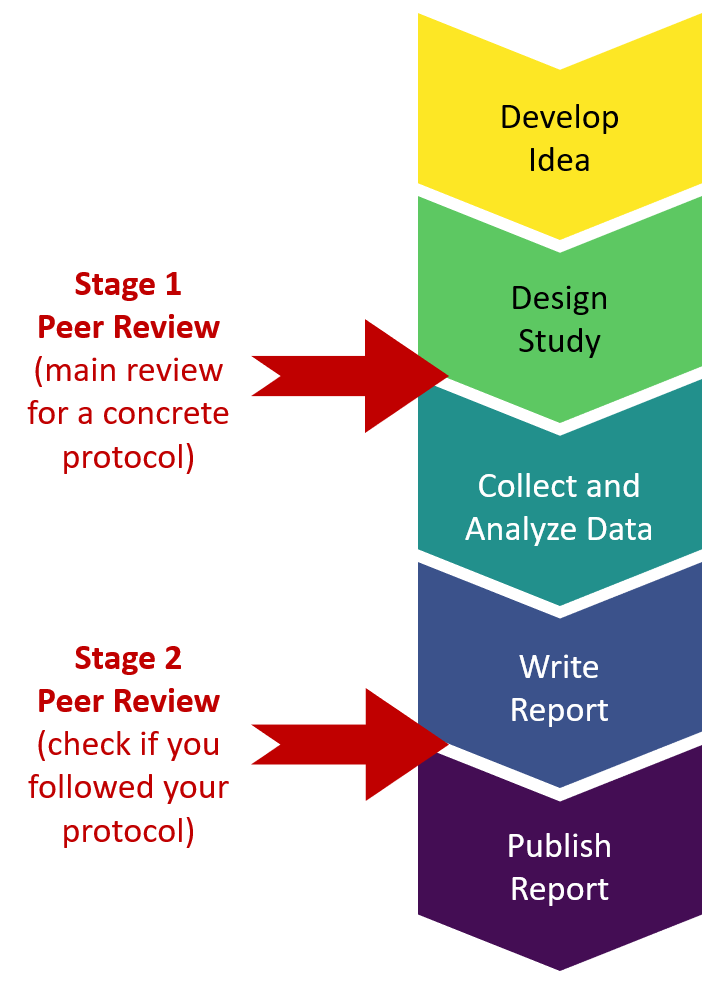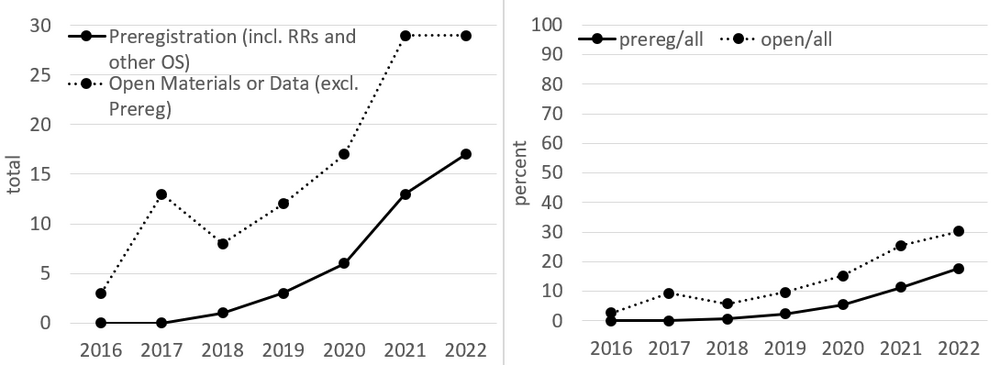Development of Open Science at the Institute of Psychology
Here we show how Open Science was gradually introduced at the Department of Psychology
Open Science in published articles
Via the "Forschungsportal", our member Hilmar Brohmer has analyzed the open science practices (open data and materials, preregistration) used in published articles of the Department of Psychology over time. This analysis is updated on an ongoing basis.
A chronology of milestones
Since most GOSI members are recruited from the Department of Psychology at the University of Graz, we would like to give a brief overview of the establishment of Open Science at the Department of Psychology.
- WS 2014/15: Florian Schöngaßner and other technical assistants at the Institute establish PsychoPy as an open source alternative to commercial experimental programs
- SS 2015: Dr. Clemens Brunner offers master exercises on R (as an alternative to SPSS) and Python.
- WS 2016/17: Social Psychology under Prof. Katja Corcoran is the first section at the department to implement Open Science practices
- SS 2017 and WS 2017/18: Preregistration becomes mandatory for Master's students in Social Psychology; other departments will follow suit in the coming years
- SS 2018: The Spring Doctoral Congress, organized by the Social Psychology Section, has a keynote speech for the first time: Rima-Maria Rahal talks about the importance of open science in research
- WS 2018/19: PhD students Gabriela Hofer and Hilmar Brohmer, as well as Tony Ross-Hellauer from TU Graz, found the Graz Open Science Initiative, which from then on organizes journal clubs and events on the topic of Open Science
- WS 2018/19: Prof. Norbert Tanzer is the first researcher at the Institute to publish an article with accessible materials, data and a preregistration (as part of a multi-lab study, Klein et al., 2018, https://doi.org/10.1177/2515245918810225)
- WS 2019/20: Dr. Karl Koschutnig establishes the BIDS format as the default output format for MRI data.
- WS 2020/21: The Graz Open Science Initiative organizes the first Open Science Day with workshops for young scientists
- SS 2021: Establishment of an Open Science exercise in the Master's program of Prof. Katja Corcoran and Hilmar Brohmer
- WS 2021/22: Christoph Anzengruber and Florian Schöngaßner develop the BIDS for PsychoPy add-on, for which they receive the Anton Schelnast Prize for Achievement and Innovation
- SS 2023: The Docotoral School Psychology (led by Prof. Stephan Vogel and Prof. Katja Corocran) is the first doctoral school at the University of Graz to introduce explicit Open Science recommendations
- WS 2023/24: The University of Graz's Development Plan 2025 includes a stronger emphasis on open science practices
- SS 2024: Since the Doctoral Congress in summer, the Doctoral School gvies an "Open Science and Transparency Award" for an outstanding paper by a PhD student (see criteria here).
- 2024: Prof. Katja Corcoran from the Social Psychology announced the winner: Živa Korda, doctoral student at the Creative Cognition Lab of Prof. Mathias Benedek
- 2025: Dr. Silvia Kober from the Neuropsychology announced the winner: Janika Saretzki, doctoral student at the Creative Cognition Lab of Prof. Mathias Benedek
Registered Reports
Registered Reports are a special publishing format in which the majority of the peer review process takes place before data collection (Stage 1). This requires particularly rigorous theoretical and methodological groundwork. After data collection, the full report (Stage 2) is only reviewed to assess whether the research team followed the preregistered plan. This complex process is expected to be streamlined in the future through the Peer Community initiative. Registered Reports are offered by many journals and have been proven to effectively reduce publication bias. They are also more theoretically and methodologically sound than conventional research articles.
Here, we appreciate the following articles that have taken on the challenging but scientifically valuable format of Registered Reports:
- Brohmer, Hofer et al. (2024). Effects of the Generic Masculine and Its Alternatives in Germanophone Countries: A Multi-Lab Replication and Extension of Stahlberg, Sczesny, and Braun (2001). doi.org/10.5334/irsp.522
- Vaidis et al. [incl. Brohmer] (2024). A multilab replication of the induced-compliance paradigm of cognitive dissonance. doi.org/10.1177/25152459231213375
- Finke et al. (2022). Unravelling the numerical and spatial underpinnings of computational thinking: a pre-registered replication study. doi.org/10.1080/08993408.2022.2079864
- Hofer et al. (2022) Love is not blind: What romantic partners know about our abilities compared to ourselves, our close friends, and our acquaintances. doi.org/10.1016/j.jrp.2022.104211
- Seifert & Paleczek (2022). Comparing tablet and print mode of a german reading comprehension test in grade 3: Influence of test order, gender and language, doi.org/10.1016/j.ijer.2022.101948
- Zickfeld et al. [incl. Schwerdtfeger] (2021). Tears evoke the intention to offer social support: A systematic investigation of the interpersonal effects of emotional crying across 41 countries. doi.org/10.1016/j.jesp.2021.104137
- Wang et al. [incl. Hofer & Brohmer] (2021). A multi-country test of brief reappraisal interventions on emotions during the COVID-19 pandemic. doi.org/10.1038/s41562-021-01173-x
- Corcoran et al. (2020). When your goals inspire my goals: the role of effort, personal value, and inference in goal contagion. doi.org/10.1177/1948550619876633
- Klein et al. [inkl. Tanzer] (2018). Many Labs 2: Investigating Variation in Replicability Across Samples and Settings. doi.org/10.1177/2515245918810225

